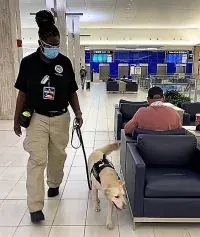 TSA partners with police to provide canine screening at Tampa International Airport for Super Bowl LV. (Photo courtesy of TSA Tampa)
TSA partners with police to provide canine screening at Tampa International Airport for Super Bowl LV. (Photo courtesy of TSA Tampa)
Dozens of lovable but security-minded canine teams flocked to Tampa, Florida, to keep fans who journeyed to the world’s biggest football stage safe and secure.
The canine teams, 35 in all, responded to a request from TSA’s National Explosives Detection Canine Team Program. They traveled to Tampa to support security operations at Super Bowl venues around the city as well as Raymond James Stadium, the site of Super Bowl LV.
Kim Vick, TSA Region 2 Field Canine Coordinator, was in charge of canine security for the Super Bowl along with pre-week events such as the NFL Super Bowl Experience, concerts and game-related events in downtown Tampa.
“Canine presence for the safety of Super Bowl LV was critical,” Vick said. “Even with the fan restrictions in place due to COVID-19, Tampa had the unprecedented privilege of having our home team (Tampa Bay Buccaneers) play in the Super Bowl in their home stadium for the first time in history. Because of that, we had much larger crowds at the Super Bowl pre-week festivities.”
Vick said TSA partnered with local police who decided where to station the various canine teams.
“The relationships between the TSA Canine Program and other agencies was exceptional,” noted Vick. “It is built on respect and professionalism. Our teams supported the mission of the local police departments with the understanding they had the lead on activities requested of them. In Tampa, our teams were under the supervision of the Tampa Police Department Bomb Squad and Special Operations Unit.”
TSA canine teams from Tampa, Orlando, Miami, Fort Lauderdale, Fort Myers and Atlanta joined the law enforcement dogs.
Michelle Draeger and her canine partner Flint traveled from Atlanta to conduct passenger screenings and help protect high-visibility areas at Tampa International Airport (TPA).
“I was excited and honored to be chosen to help with this event,” said Draeger, in her 11th year as a dog handler and her third time working a Super Bowl event.
Draeger said it was a great experience, but she and Flint were there for business – to keep the traveling public safe.
“The canine presence is definitely a deterrent when passengers see the dogs,” said Draeger. “[Canine] teams screening passengers is another level of security to help keep everyone traveling by air safe.”
Anyiliet Rodriguez has only been a dog handler for two years so was extremely excited and humbled to be part of this big event. She and her partner Jung were stationed alongside TPA police, helping with a variety of screening and security duties, including canine security sweeps of vehicles, baggage and passengers.
“The relationship between TSA Canine and Tampa International Airport police was truly a unified working environment,” Rodriguez said. “There was an abundance of mutual respect, communication and inclusion between the departments. The unified partnership definitely succeeded in protecting and securing the traveling public from any unforeseen harm.”
Rodriguez described her Super Bowl experience in Tampa as “nothing short of a wonderful experience both while on and off duty.”
Corporal Traci Dietz was among the many airport police officers Draeger and Rodriguez partnered with. Dietz, an eight-year dog handler, was responsible for supervising police and visiting TSA canine teams during airport operations. They also helped the Tampa Bay Region Bomb Squad and Tampa Police Department with sweeps of the Super Bowl venues downtown.
“Quite a few passengers asked why there were so many canine teams,” recalled Dietz. “All were very pleased to hear the answer was to ensure their safety.”
Dietz believes the Super Bowl experience was a great example of the excellent partnership between airport police and TSA canine teams.
“Having our TSA partners visit airport property and getting to take our canines to outside venues was exciting,” said Dietz. “I personally find it beneficial to get to cross-train and learn from other handlers. It is advantageous when individuals with common goals and interests are able to join together in camaraderie and help one another.”
As the TSA canine supervisor for TPA, Reggie Ross had the important task of developing efficient and effective daily assignments. Teams were divided into three shifts, although the pandemic greatly decreased the number of football fans traveling to Tampa for the big game and required some tactical adjustments to screening operations.
“Original canine staffing for the Super Bowl was created without knowing how the pandemic would impact the game,” said Ross. “As we got closer to the actual event and the number of people attending the game and game-related festivities was lowered, leadership reallocated six [TSA] teams to support the police canine team.”
Ross said everyone worked well together.
“I constantly witnessed open communication between the Federal Air Marshal Service, TSA explosives specialists and canine handlers with the common goal of providing an additional layer of security and support to the TPA operation,” Ross noted.
During one of the many security briefings to prepare the visiting canine teams, Greater Tampa Bay TSA Federal Security Director Kirk Skinner said, “I want to thank all of you who came from outside of our area to assist with this tremendous event and under such difficult circumstances. Our shared goal is to make sure our airports, the NFL venues and the Super Bowl itself are secure and the American people can do what they do best, which is watch football on a Sunday. Thanks for the sacrifices you made.”
“In events such as this, there is no greater satisfaction than seeing how individuals from over 100 agencies across the country can come together to ensure the protection and safety of American citizens solely out of their commitment and dedication to do so,” Vick emphasized.
“These selfless acts of patriotism, especially symbolized in America’s Super Bowl, which is watched worldwide, should be respected by all.”




